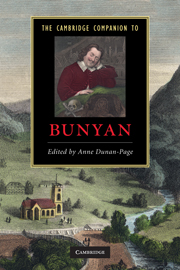Book contents
- Frontmatter
- Introduction
- Part I John Bunyan in his seventeenth-century context
- 1 John Bunyan’s literary life
- 2 John Bunyan and Restoration literature
- 3 John Bunyan and the Bible
- 4 John Bunyan and the goodwives of Bedford: a psychoanalytic approach
- Part II John Bunyan’s major works
- Part III Readership and reception
- Guide to further reading
- Index
4 - John Bunyan and the goodwives of Bedford: a psychoanalytic approach
from Part I - John Bunyan in his seventeenth-century context
Published online by Cambridge University Press: 28 July 2010
- Frontmatter
- Introduction
- Part I John Bunyan in his seventeenth-century context
- 1 John Bunyan’s literary life
- 2 John Bunyan and Restoration literature
- 3 John Bunyan and the Bible
- 4 John Bunyan and the goodwives of Bedford: a psychoanalytic approach
- Part II John Bunyan’s major works
- Part III Readership and reception
- Guide to further reading
- Index
Summary
“For where two or three are gathered together in my name, there am I in the midst of them.” (Matthew 18:20) / In his youth, John Bunyan knew what it was to feel keenly the reproach of a woman. In Grace Abounding to the Chief of Sinners (1666), he describes how he was once shamed by an encounter with a local shopkeeper's wife: “But one day, as I was standing at a Neighbours Shop-window, and there cursing and swearing, and playing the Mad-man, after my wonted manner, there sate within the woman of the house, and heard me; who, though she was a very loose and ungodly Wretch, yet protested that I swore and cursed at that most fearful rate, that she was made to tremble to hear me; And told me further, That I was the ungodliest Fellow for swearing that she ever heard in all her life . . . At this reproof I was silenced, and put to secret shame; and that too, as I thought, before the God of Heaven: wherefore, while I stood there, and hanging down my head, I wished with all my heart that I might be a little childe again, that my Father might learn me to speak without this wicked way of swearing . . .” (GA, p. 11-12).
- Type
- Chapter
- Information
- The Cambridge Companion to Bunyan , pp. 51 - 64Publisher: Cambridge University PressPrint publication year: 2010
- 2
- Cited by

